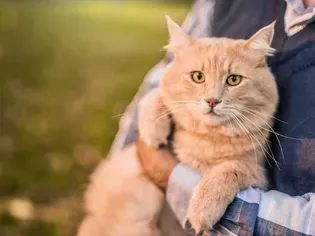Dementia in Cats
Updated on 05/26/24

Dementia in Cats: A Comprehensive Guide to Understanding and Managing Cognitive Decline in Your Feline Friend
As our feline companions age, it's not uncommon for them to experience cognitive changes that can be concerning for their owners. Dementia, a condition that affects memory, learning, and behavior, is a common issue in senior cats. Understanding the signs, causes, and management strategies for dementia can help you provide the best possible care for your beloved pet.
Recognizing the Signs of Dementia in Cats
The symptoms of dementia in cats can be subtle at first, but they may become more noticeable as the condition progresses. Some common signs to look out for include:
* Disorientation and Confusion: Cats with dementia may become lost in familiar places, wander aimlessly, or have difficulty finding their food and water bowls.
* Altered Sleep Patterns: Cats with dementia may experience changes in their sleep patterns, such as sleeping more during the day and being awake and restless at night.
* Changes in Behavior: Cats with dementia may exhibit changes in their behavior, becoming more withdrawn or aggressive, or showing less interest in activities they once enjoyed.
* Cognitive Impairment: Cats with dementia may have difficulty learning new things, remembering familiar people and places, or following commands.
* Vocalizations: Cats with dementia may vocalize more frequently, especially at night, as a result of confusion or anxiety.
Causes of Dementia in Cats
The exact cause of dementia in cats is not fully understood, but it is believed to be caused by a combination of factors, including:
* Age: The risk of dementia increases as cats age, with the condition being most common in cats over 10 years old.
* Genetics: Some breeds of cats, such as Siamese and Burmese cats, are more prone to developing dementia.
* Underlying Medical Conditions: Certain medical conditions, such as hyperthyroidism and kidney disease, can contribute to cognitive decline in cats.
Managing Dementia in Cats
While there is no cure for dementia in cats, there are a number of things you can do to manage the condition and improve your cat's quality of life:
* Provide a Safe and Familiar Environment: Ensure your cat's environment is free of obstacles, has clear pathways, and is familiar to them.
* Establish a Routine: Maintaining a consistent routine for your cat, including feeding, play, and grooming times, can help them feel more secure and reduce confusion.
* Exercise Your Cat's Mind: Engage your cat in mentally stimulating activities, such as puzzle toys, interactive games, and hide-and-seek, to keep their mind active.
* Enrich Your Cat's Environment: Provide your cat with plenty of vertical spaces, scratching posts, and hiding places to encourage exploration and reduce boredom.
* Consider Medication: In some cases, your veterinarian may prescribe medication, such as anti-anxiety drugs or supplements, to help manage your cat's symptoms.
Examples of Dementia in Cats
To illustrate the various signs and manifestations of dementia in cats, here are some real-world examples:
* Example 1: A previously active and social 12-year-old cat starts becoming disoriented and confused. He wanders aimlessly around the house, forgets where his food and water bowls are, and doesn't recognize his owners at times.
* Example 2: A 9-year-old cat that once loved to play with toys now shows little interest in them. She spends most of her time sleeping, and when she is awake, she appears withdrawn and confused.
* Example 3: A 13-year-old cat that has always been affectionate and snuggly becomes increasingly aggressive towards his owners. He hisses and scratches when petted, and he vocalizes loudly at night.
Conclusion
Dementia is a challenging condition for cats and their owners alike. However, by understanding the signs and causes of dementia and implementing effective management strategies, you can help your beloved feline companion live a comfortable and fulfilling life despite their cognitive decline. Remember to consult with your veterinarian regularly for professional advice and support in managing your cat's dementia.
Explore More Pets

Cat Behavior Problems
How to Stop Aggression in Kittens

Long-Haired Cat Breeds
Siberian Cat: Breed Profile, Characteristics, & Care

Cat Behavior Problems
How to Stop Kittens From Scratching and Biting

Long-Haired Cat Breeds
Turkish Angora: Cat Breed Profile, Characteristics & Care

Basic Training
How to Socialize Your Kitten

Short-Haired Cat Breeds
Cute Pictures & Facts About Calico Cats & Kittens

Litter Box Training
Training Your Kitten to Use the Litter Box

Long-Haired Cat Breeds
10 Fun Facts About White Cats
